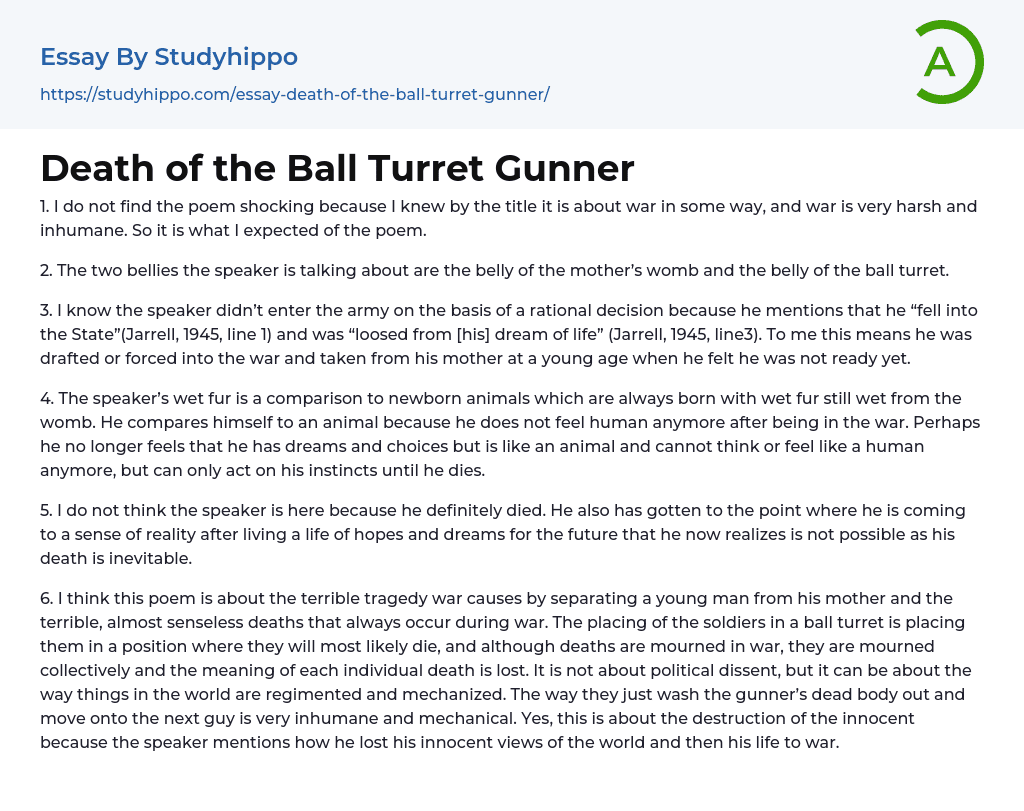1. I do not find the poem shocking because I knew by the title it is about war in some way, and war is very harsh and inhumane. So it is what I expected of the poem.
2. The two bellies the speaker is talking about are the belly of the mother’s womb and the belly of the ball turret.
3. I know the speaker didn’t enter the army on the basis of a rational decision because he mentions that he “fell into the State”(Jarrell, 1945, line 1) and was “loosed from [his] dream of life” (Jarrell, 1945, line3). To me this means he was drafted or forced into the war and taken from his mother at a young age when he felt he was not ready yet.
4
.... The speaker’s wet fur is a comparison to newborn animals which are always born with wet fur still wet from the womb. He compares himself to an animal because he does not feel human anymore after being in the war. Perhaps he no longer feels that he has dreams and choices but is like an animal and cannot think or feel like a human anymore, but can only act on his instincts until he dies.
5. I do not think the speaker is here because he definitely died. He also has gotten to the point where he is coming to a sense of reality after living a life of hopes and dreams for the future that he now realizes is not possible as his death is inevitable.
6. I think this poem is about the terrible tragedy war causes
by separating a young man from his mother and the terrible, almost senseless deaths that always occur during war. The placing of the soldiers in a ball turret is placing them in a position where they will most likely die, and although deaths are mourned in war, they are mourned collectively and the meaning of each individual death is lost. It is not about political dissent, but it can be about the way things in the world are regimented and mechanized. The way they just wash the gunner’s dead body out and move onto the next guy is very inhumane and mechanical. Yes, this is about the destruction of the innocent because the speaker mentions how he lost his innocent views of the world and then his life to war.
- Age Of Enlightenment essays
- Ethos essays
- Time essays
- Acceptance essays
- Meaning Of Life essays
- Reality essays
- Natural Law essays
- Political Philosophy essays
- Utilitarianism essays
- Existence essays
- Free Will essays
- Good And Evil essays
- Confucianism essays
- Relativism essays
- Conscience essays
- Environmentalism essays
- Empiricism essays
- Epistemology essays
- Ethics essays
- Existentialism essays
- Human Nature essays
- Individualism essays
- Metaphysics essays
- Philosophy Of Life essays
- Transcendentalism essays
- Truth essays
- Destiny essays
- Determinism essays
- Fate essays
- Functionalism essays
- Philosophers essays
- Pragmatism essays
- Future essays
- Child Observation essays
- Critical Reflection essays
- Teaching Philosophy essays
- Personal Philosophy essays
- Action Speak Louder Than Words essays
- Can Money Buy Happiness essays
- Values of Life essays
- Ethical dilemma essays
- Normative Ethics essays
- Virtue Ethics essays
- Belief essays
- Deontology essays
- Moral essays
- Virtue essays
- Work Ethic essays
- Henry David Thoreau essays
- Carl Jung essays




